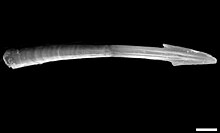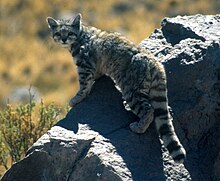This article needs additional citations for verification. (August 2022) |



Animals are multicellular eukaryotic organisms in the biological kingdom Animalia. With few exceptions, animals consume organic material, breathe oxygen, are able to move, reproduce sexually, and grow from a hollow sphere of cells, the blastula, during embryonic development. Over 1.5 million living animal species have been described—of which around 1 million are insects—but it has been estimated there are over 7 million in total. Animals range in size from 8.5 millionths of a metre to 33.6 metres (110 ft) long and have complex interactions with each other and their environments, forming intricate food webs. The study of animals is called zoology.
Animals may be listed or indexed by many criteria, including taxonomy, status as endangered species, their geographical location, and their portrayal and/or naming in human culture.
By common name
- List of animal names (male, female, young, and group)
By aspect
- List of common household pests
- List of animal sounds
- List of animals by number of legs
- List of animals by number of neurons
- Largest and heaviest animals
By domestication

By eating behaviour
By endangered status

By extinction
By region
- Lists of amphibians by region
- Lists of birds by region
- Lists of mammals by region
- Lists of reptiles by region
By individual (real or fictional)
Real
- List of individual cats
- List of giant squids
- List of individual elephants
- List of historical horses
- List of individual apes
- List of individual bears
- List of individual birds
- List of individual bovines
- List of individual cetaceans
- List of individual dogs
- List of individual monkeys
- List of individual pigs
- List of wolves
- List of wealthiest animals
Fictional
- List of fictional arthropods
- List of fictional bears
- List of fictional birds
- List of fictional dogs
- List of fictional felines
- List of fictional frogs and toads
- List of fictional horses
- List of fictional pachyderms
- List of fictional pigs
- List of fictional primates
- List of fictional snakes
- List of fictional turtles
- List of fictional worms
By taxonomical classification
Phyla

The animal Kingdom contains some 35 extant phyla.
Basal animals are delineated according to the following cladogram:
| Choanozoa (950) | |
Animals: Porifera, Diploblasts
Diploblasts: Ctenophora, ParaHoxozoa
ParaHoxozoa: Placozoa, Cnidaria, Bilateria/Triploblast
Bilateria: Xenacoelomorpha, Nephrozoa
Nephrozoa: Protostomes, Deuterostomes
- Phylum Proarticulata † Disputed if this is in or out of Bilateria and Phylum Xenacoelomorpha is basal
- Phylum Chordata
- Ambulacraria (unranked)
- Phylum Hemichordata
- Phylum Echinodermata
- Phylum Cambroernida †
- Phylum Saccorhytida?[1] †
- Cycloneuralia (unranked)
- Scalidophora (unranked)
- Phylum Kinorhyncha
- Phylum Loricifera
- Phylum Priapulida
- Nematoida (unranked)
- Phylum Nematoda
- Phylum Nematomorpha
- Scalidophora (unranked)
- Panarthropoda (unranked)
- Phylum Onychophora
- Tactopoda (unranked)
- Phylum Tardigrada
- Phylum Arthropoda
- Gnathifera
- Phylum Gnathostomulida
- Phylum Rotifera
- Mesozoa
- Phylum Dicyemida
- Phylum Orthonectida
- Rouphozoa
- Phylum Gastrotricha
- Phylum Platyhelminthes
- Lophotrochozoa
- Phylum Hyolitha †
- Phylum Annelida
- Phylum Brachiopoda
- Phylum Bryozoa
- Phylum Cycliophora
- Phylum Entoprocta
- Phylum Mollusca
- Phylum Nemertea
- Phylum Phoronida
Chordata
Fish
Amphibians
Reptiles
- List of reptiles
- List of ichthyosaur genera
- List of pterosaur genera
- List of plesiosaur genera
- List of dinosaur genera
- List of snakes
- List of snake genera
- List of boine species and subspecies
- List of erycine species and subspecies
- List of pythonid species and subspecies
- List of tropidophiid species and subspecies
- List of uropeltid species and subspecies
- List of crotaline species and subspecies
- List of viperine species and subspecies
- List of anomalepidid species and subspecies
- List of leptotyphlopid species and subspecies
- List of typhlopid species and subspecies
- List of Testudines families (tortoises, turtles and terrapins)
References
- ^ Liu, Yunhuan; Carlisle, Emily; Zhang, Huaqiao; Yang, Ben; Steiner, Michael; Shao, Tiequan; Duan, Baichuan; Marone, Federica; Xiao, Shuhai; Donoghue, Philip C. J. (17 August 2022). "Saccorhytus is an early ecdysozoan and not the earliest deuterostome". Nature. 609 (7927): 541–546. Bibcode:2022Natur.609..541L. doi:10.1038/s41586-022-05107-z. ISSN 1476-4687. PMID 35978194. S2CID 251646316.










